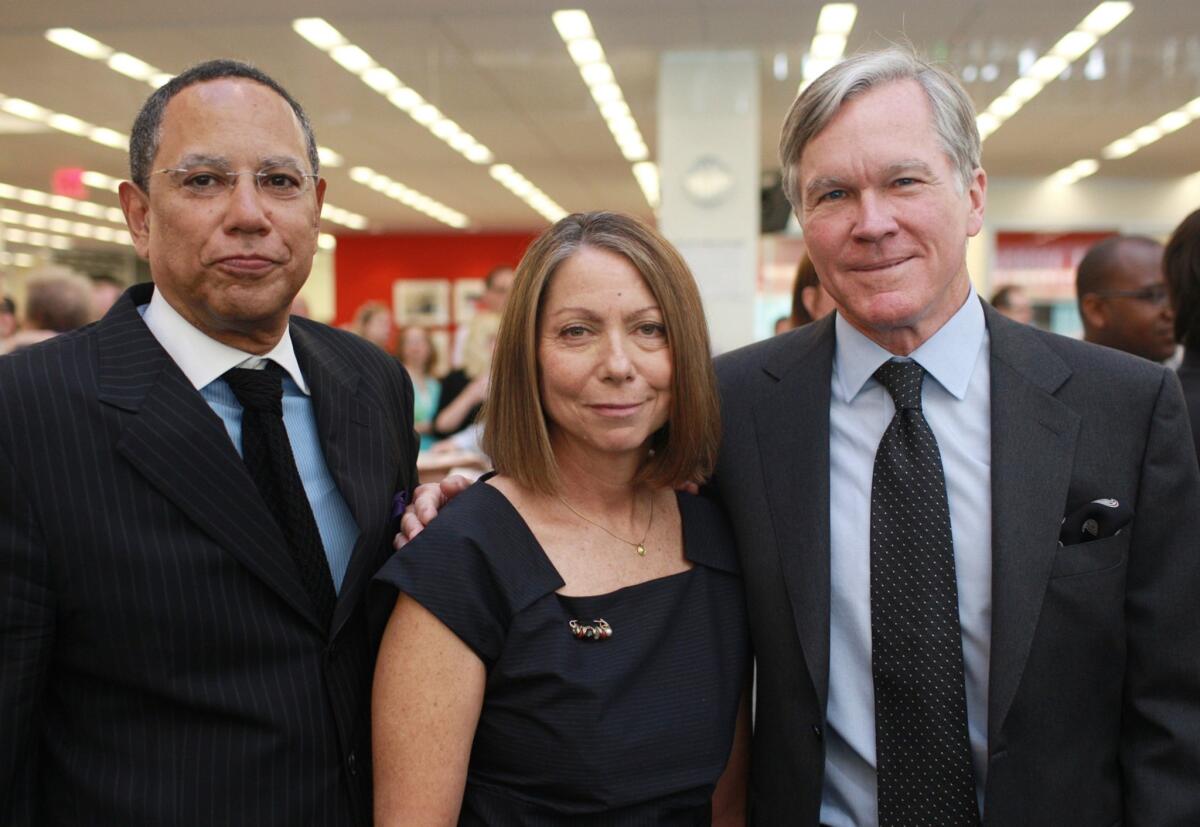Dean Baquet to replace Jill Abramson as New York Times’ top editor

Just three years into her tenure, the first female editor of the New York Times was forced out because of what the publisher called management issues in the newsroom.
Jill Abramson will be replaced by managing editor Dean Baquet, who will be the newspaper’s first African American executive editor. Baquet is the former editor of the Los Angeles Times.
New York Times publisher Arthur Sulzberger Jr. informed senior editors of the change Wednesday afternoon, then spoke to the newsroom. The switch was not about the quality of the paper’s journalism, nor about disagreements with Abramson on its digital future, he said.
“Rather, I choose to appoint a new leader for our newsroom because I believe that new leadership will improve some aspects of the management of the newsroom,” Sulzberger told employees, according to remarks provided by a New York Times spokeswoman.
The news sent shock waves through the journalism world because Abramson’s tenure was relatively short, and because the newspaper had been performing relatively well. It launched a host of digital brands, including Upshot and NYT Now, and circulation is up from a year ago.
“This is extremely abrupt — I don’t think anyone saw it coming,” said Alan Mutter, an industry consultant and former newspaper editor who blogs about journalism. “But it’s sort of self-evident that when the publisher comes in and says there’s management issues and we’re changing editors, things weren’t going to his satisfaction.”
One New York Times reporter said journalists were “open-mouthed” over Abramson’s ouster. “I have talked to a lot of people here today, and no one saw this coming, I mean no one,” said the reporter, who declined to be identified because of the sensitivity of the situation.
The journalist said he and others were surprised, in particular, by the abruptness of the move and the fact that the paper and Abramson could not reach an accommodation that allowed her to leave on her terms.
Speculation had been swirling that Abramson told management she wanted to remain in charge through the 2016 presidential election. That would have put her just a few years shy of 65, the Times’ mandatory retirement age for senior executives. But it also would have left Baquet, her presumed successor, with a short tenure. Baquet, 57, will be 60 by the time that election is over.
Abramson joined the paper in 1997 and became managing editor in 2003. She became executive editor in September 2011.
In April 2013, Politico published a story in which New York Times staffers labeled her “stubborn and condescending.” The article, which highly praised Baquet, alleged that Abramson was “on the verge of losing the support of the newsroom.”
That story prompted its own criticism that Abramson was being beaten up for things that would have been praised in a male colleague. She said at the time that she cried after reading the piece.
In a statement Wednesday, Abramson said she had loved her run at the Times.
“I got to work with the best journalists in the world doing so much stand-up journalism,” she said. “Dean has been my partner in all this, and he will be a great executive editor.”
Baquet, then the New York Times’ national editor, joined the Los Angeles Times as managing editor in 2000. He became editor in 2005 but left in 2006 amid a dispute over the size of the newsroom staff. He rejoined the New York Times in 2007.
No editors in modern history have worked at the top position in both papers, said Mutter, the industry expert.
Last week, the Huffington Post reported that Baquet had been recruited to lead Washington coverage for Bloomberg News.
Times journalists have seen recent editors as either shy, unapproachable or both. Baquet is known as a master of “walking around” management, working the newsroom to learn what reporters are working on and cheerleading his staff. “That sort of thing has been notably lacking around here,” the reporter said. “But what’s most important is that he promote good people and make good decisions about journalism.”
Sulzberger hinted that Baquet’s reputation in the newsroom was one reason for making the shift.
“He is an exceptional reporter and editor with impeccable news judgment who enjoys the confidence and support of his colleagues around the world and across the organization,” he said.
More to Read
Start your day right
Sign up for Essential California for news, features and recommendations from the L.A. Times and beyond in your inbox six days a week.
You may occasionally receive promotional content from the Los Angeles Times.







